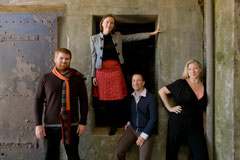The Cypress String Quartet’s Call & Response
The San Francisco Examiner
April 4, 2009
by Mark Rudio

The Cypress String Quartet's Call and Response program commissions new works from contemporary, young composers to create a musical dialogue between the past and present. Saturday night at Herbst Theater they presented the tenth anniversary edition in program featuring Kevin Puts Lento Assai, Mendelssohn's String Quartet in A Minor, Op. 13 and Beethoven's F Major Quartet, Op. 135. The dialogue between the three works was apparent as the concert progressed- this was a consistently rewarding program, well played by each member of the CSQ.
Mendelssohn's quartet, written the year of Beethoven's death, asks the question, "Ist es Wahr (Is it true)?" in response to Beethoven's "Muss es sein (Must it be)?" Placed between the two, Puts' piece seemed to be the interior deliberation of someone pondering both questions before answering in the affirmative. CSQ played the second movement of the Mendelssohn with a delicacy that gave it a lush cinematic quality. The fourth movement's distant clarion call suggested to me the answer to Mendelssohn's (and Beethoven's) question was to move forward and never look back.
Lento Assai is the tempo marking for the slow movement of the Beethoven quartet. Before the performance, Puts offered the audience some comments about how the piece came together, saying that he was inspired to use the existing connections between the other works as a starting point for his own. On hearing it for the first time, my opinion is that he succeeded handsomely. This is a piece I would definitely like to hear again and thanks to this program I've been introduced to a composer whose work I'll now be seeking out.
This particular Beethoven quartet holds a special place in my own journey of musical appreciation. Years ago, after ending a torrid fling, I received an anonymous package in the mail containing a copy of The Unbearable Lightness of Being with "Muss es sein?" written in delicate handwriting on the inner jacket. After reading the book (the relevance of it to my life is another post entirely, probably not suitable for this site), I delved into Beethoven's late quartets with a curiosity that bordered on obsession. Alongside the Ring, I would be in the camp of those who believe these works may be the finest music ever written.
I've always considered this to be a dark work, tinged with mockery aimed at the face of fate, but the CSQ brought out a light, playful and exuberant tone I never really noticed before in the first movement. The second movement was played with great propulsion, with cellist Jennifer Kloetzel creating great churning currents of sound. The slow movement was played with a tender grace, while the fourth movement's motive wasn't scary, but pugnacious and pushy. It was a terrific reading of the work.
The audience was filled with a large number of mostly well-behaved students participating in Call & Response, who applauded at the end of every movement- Emmanuel Ax would have been pleased. The Call & Response program deserves real credit and support for commissioning new works and bringing them to the public through a terrific outreach program aimed at younger and student audiences. I look forward to next year's presentation. Check out the Cypress String Quartet's website for more information.
There will be another performance by the quartet on May 3rd at Hertz Hall on the Berkeley Campus with a program of Haydn, Bartok and Beethoven. Check it out.